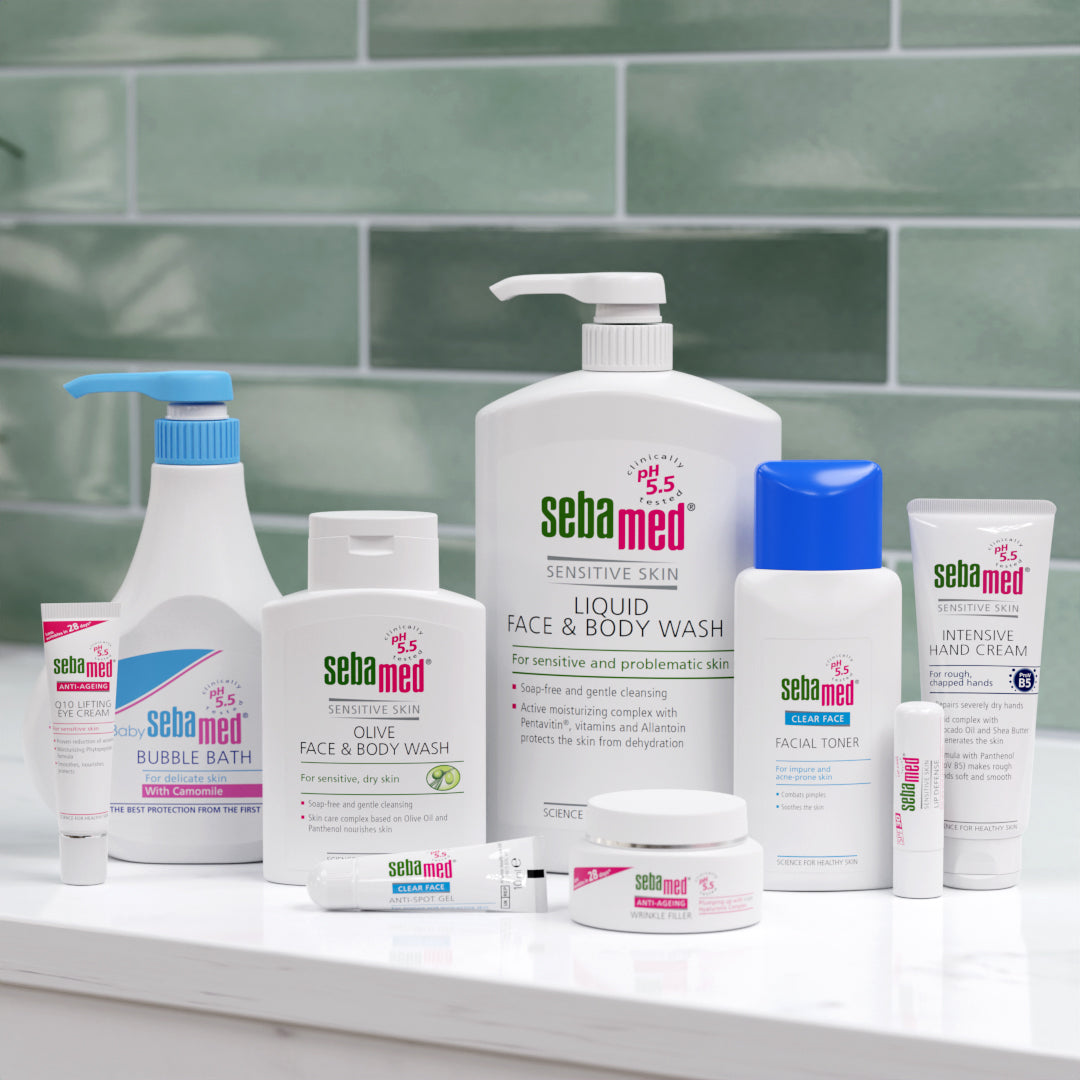Acne is a common skin condition that can affect anyone, at any age. While it’s commonly seen in teenagers navigating puberty, adults and children can also experience unexpected blackheads, whiteheads, spots and blemishes. Acne can take a toll on our confidence and self-esteem, often leaving us unsure about which products will help and which ones will make it worse.
Therefore, we’ve decided to make it easy for you. Find out what acne is, what causes it, how to manage acne and what products we recommend to tackle breakouts.
What is Acne?
Acne occurs when hair follicles become clogged with sebum, dead skin cells and bacteria. Hair follicles are tiny holes in the skin where hair grows and each one is connected to a sebaceous gland. These glands are found near the surface of the skin and are responsible for producing sebum which helps to lubricate the skin and hair to stop it drying out.
When we experience acne, the glands start to produce too much sebum - and this excess sebum mixed with dead skin cells forms a plug that blocks the follicle. If this blocked follicle is close to the skin’s surface, it pushes outwards and creates a whitehead. If the follicle is open to the skin, it creates a blackhead.
Acne most often appears on the face, but it can also affect the back, chest, shoulders and neck. It can range from mild to severe and may cause inflammation, redness and discomfort.
What causes Acne?
Acne is mostly linked to the changes in hormones during puberty, but it can affect anyone at any age.
Children
There are many reasons why acne can develop in childhood. Hormonal changes, especially around the ages of 7 to 12 can cause slight hormonal shifts which can stimulate the sebaceous glands to produce more sebum leading to blocked pores.
Skincare products can also cause outbreaks of blackheads, whiteheads, spots and blemishes. Greasy or heavy products, such as lotions, creams or makeup can clog pores. Cleansing habits are also important - not washing the skin regularly can also lead to a buildup of dirt, but also washing the skin too much with harsh soap can disrupt the skin’s natural microbiome causing irritation of the skin and make acne more prone.
Teenagers
Teenagers often experience acne as their skin can go through significant changes during adolescence. Hormonal fluctuations, such as an increased level of testosterone or the beginning of the menstrual cycle can mean the body produces a higher level of sebum, leading to oily skin and the potential for acne.
Teenagers' skin is also very sensitive. Using heavy makeup or oily products can also clog pores, especially if the makeup isn’t removed properly before bed. Stress is also another factor - although it does not directly cause acne, it can affect hormone levels and increase inflammation which may worsen breakouts.
Adults
Adult acne, especially in women, can be just as frustrating as when we experience it in adolescence. One of the most common causes of adult acne is hormonal fluctuations. Many women experience an increase in breakouts around their period, especially in the days leading up to it. The changes in hormone levels during pregnancy, perimenopause or menopause can also cause an increase in breakouts as changes in oestrogen and progesterone levels can influence oil production.
Stress is also a contributing factor for adult acne, as increased cortisol levels can cause our bodies to produce excess sebum, leading to clogged pores and inflammation. Over time, chronic stress can weaken the immune system and the skin barrier function - making the skin more vulnerable to breakouts or irritation.
Certain skincare products can also cause adult acne. Heavy creams or makeup can trap dirt and oil in the pores, leading to blocked pores and acne.
How do I manage acne?
Managing acne at any age requires a few different strategies.
Use the right skincare products
It’s important to choose gentle, pH-balanced products that are designed to restore and maintain the skin’s natural barrier while cleansing and unclogging pores.
A daily skincare routine should include:
A mild, soap-free cleanser - This helps to remove excess oil, dirt, and bacteria without stripping the skin.
Toner - Using a gentle toner after cleansing can help to manage acne by washing away any remaining oil, dirt or bacteria that has been left on the skin whilst keeping the skin hydrated.
A gentle exfoliator - Gentle exfoliation 1-2 times a week can help remove dead skin cells that can clog pores. Only teenagers and adults need exfoliation as children’s skin is too sensitive. Products with micro-peeling particles made from natural lipids work well as they exfoliate without damaging or irritating the skin.
Spot treatment - Products with salicylic acid, niacinamide, or panthenol can help to manage acne by reducing inflammation and clear blemishes.
A lightweight moisturiser - even oily and acne-prone skin needs moisture - but choose one that is lightweight that hydrates without clogging pores.
Reduce stress
Stress plays a bigger role in our skin health than many people realise. Stress causes the body to produce more cortisol, which is a hormone that can trigger the sebaceous glands to produce more sebum.
Managing stress can reduce these flare-ups, so whether you prefer to meditate or do deep breathing exercises, engage in regular exercise, get enough restful sleep or take short breaks during the day to relax and reset - any small step to manage stress can have a noticeable impact on your skin.
Be consistent
Managing acne is not something that happens quickly - sometimes it can take several weeks of consistent use before you see improvements. Therefore, it’s important to create a skincare routine that is going to nourish and protect your skin, like the one we have suggested above. Ensure you are consistent with the routine and try to avoid the temptation to switch products too soon as this can lead to further irritation.
Spot treatment
When spots appear, remember to treat the spot with a spot treatment that targets bacteria, reduces inflammation and dries the spot out on all spots, blackheads and skin impurities - without irritating the surrounding skin.
What products do you recommend?
We offer a wide range of products that help manage oily or acne-prone skin.
Sebamed Clear Face Antibacterial Cleansing Foam
A gentle, pH-balanced cleanser that contains the active ingredient Montaline C40 helps to manage acne by combating pimples and blackheads by helping to restore the skin’s balance and wash away dirt and bacteria.
Sebamed Clear Face Mattifying Cream
A soothing moisturiser that can help to regular sebum production. With its nourishing ingredients like Horse Chestnut - it can help to manage acne by reducing irritation and skin impurities.
Sebamed Clear Face Facial Toner
A facial toner that can be used after cleansing the skin. Helps to remove any excess oil or dirt without drying it out. Formulated with ingredients like Panthenol to help to repair the skin and Witch hazel to soothe irritated skin.
Check out our full range of products to tackle acne-prone skin here…






